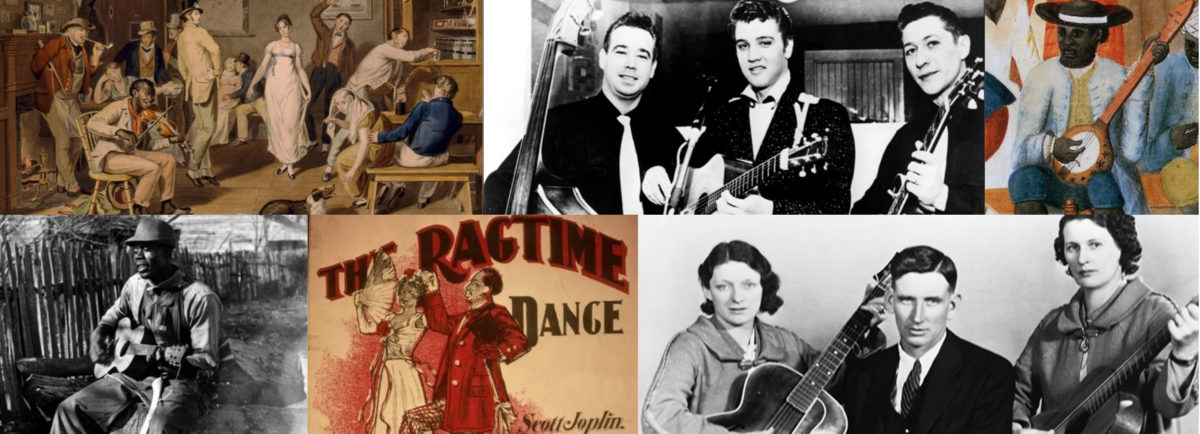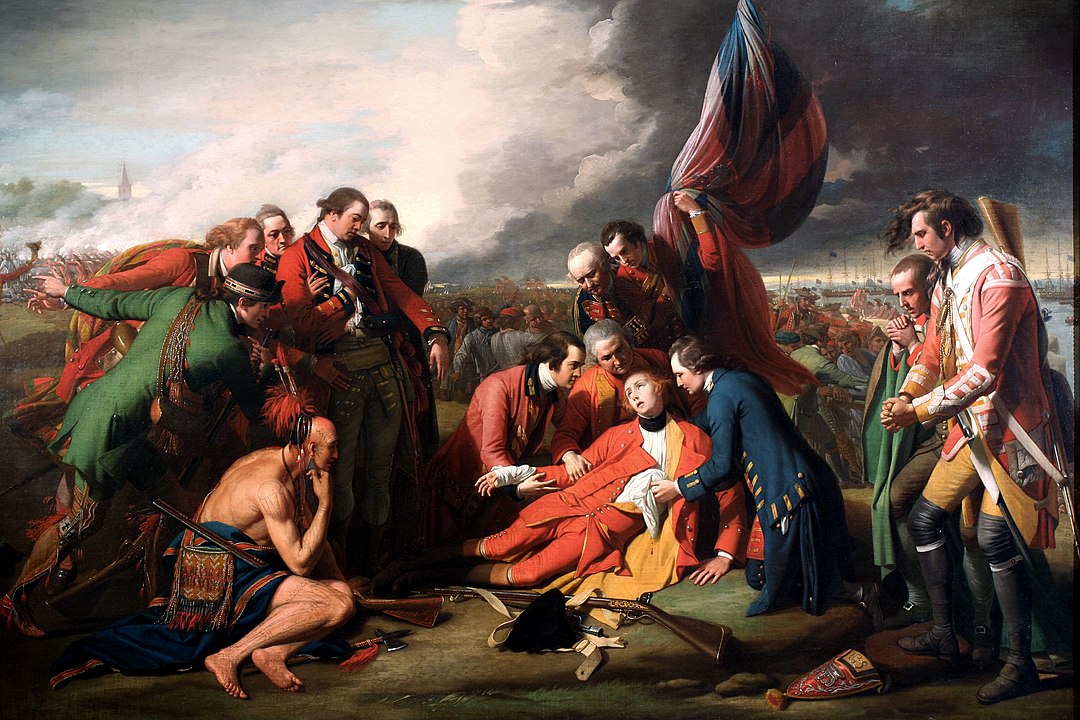Overview
“Brave Wolfe” is one of the earliest broadside ballads composed in North America of which we have a record. The song tells the story of General James Wolfe, who led Great Britain to victory in the North American front of the international Seven Years’ War fought between 1756 and 1763. England’s defeat of France, Spain, and their Indigenous American allies, gave them control over North America east of the Mississippi River. Colonists celebrated General Wolfe as a hero, creating, singing, and disseminating versions of this ballad.
Historical Background
Settlers in the New World
For more than a century before the founding of the United States of America as an independent nation, European empires struggled for dominance of the New World. Spanish explorers and conquistadors made the first significant inroads on indigenous lands beginning with Christopher Columbus’ voyage in 1492. By the mid-1700s, the Spanish Empire in the Americas included much of South America, Central America, the Caribbean, and North America west of the Mississippi River.
Great Britain established their first permanent New World settlement in Jamestown, Virginia, in 1607. Over the following century and a half, people and capital flowed into settlements from Maine to Georgia. In 1732, King George II granted James Oglethorpe a land charter that established Georgia as the last of thirteen British colonies on the Atlantic coast of North America.
French settlement began in 1534 when Jacques Cartier founded New France on the shore of the Gaspé Peninsula along the southern coast of the Saint Lawrence River in eastern Canada. In 1608, Samuel de Champlain founded the town of Quebec, establishing a permanent settlement and fur trading post. There was money to be made shipping beaver pelts across the Atlantic to meet the demand for coats and hats made from the fur. The French gradually established trade agreements with Hurons, Ottawas, and Ojibwas around the Great Lakes and upper Mississippi River, providing weapons, tools, and money in exchange for pelts. Overcoming initial distrust and conflict, they developed nuanced trade and social relationships that benefitted all parties. By the 1750s, France had claimed most of Canada and the Great Lakes region.
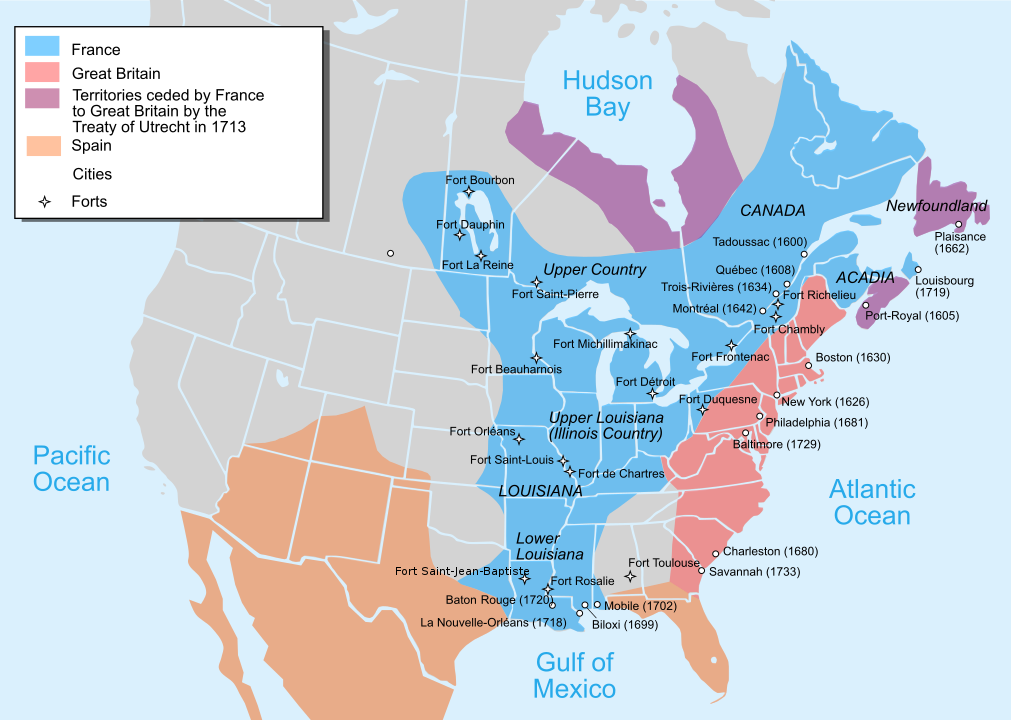
Seven Years' War
As land in the English colonies became more crowded and expensive, people set their sights on the West. Conflict frequently erupted as English newcomers advanced on the frontier lands claimed by the French in the upper Ohio River Valley. In 1749, King George II granted 200,000 acres of land to the Ohio Company of Virginia. The site of present-day Pittsburgh, the land stretched from the confluence of the Allegheny and Monongahela rivers, which flow together to form the Ohio River. The French constructed several forts to protect their land holdings from British encroachers.
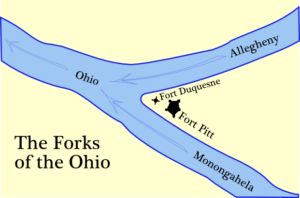
The royal governor of Virginia sent 22-year-old George Washington with an armed militia to evict the French from land granted to the Ohio Company. The French refused to abandon their lands. At dawn on May 28, 1754, Washington attacked French soldiers under the command of Joseph Coulon de Villiers de Jumonville at a glen near the French Fort Duquesne. The attack resulted in the death of Jumonville and several others. Fearing reprisal, Washington’s men constructed Fort Necessity about forty miles from Fort Duquesne. On July 3, French and Indian forces surrounded Fort Necessity and, from the woods, opened fire on Washington’s men who stood in ranks outside the fort. Washington surrendered and returned with his men to Virginia. The French and Indian War had begun.
British General Edward Braddock, aided by Washington, also failed to drive out the French. After suffering a series of defeats in 1755 and 1756, Britain’s William Pitt paid the colonies to raise armies to defeat the French. British victory at Louisbourg in July 1758 led to a series of wins. In October, seeing the tide turning, thirteen Indigenous nations, representing tribes of the Iroquois, Lanape, and Shawnee, joined forces with the British. As a British expedition led by Brigadier-General John Forbes advanced on Fort Duquesne, the French destroyed the fort. Forbes’ men, including a contingent of Virginians led by Washington, re-built it as Fort Pitt near the original site.
Pitt appointed 32-year-old James Wolfe to lead an expedition to capture the French city of Quebec. Wolfe, born into a military family in Westerham, Kent, in South East England, had served in Europe in the War of the Austrian Succession. In the Seven Years’ War, as brigadier general under Major General Jeffrey Amherst, he contributed greatly to the capture of Louisbourg in 1758.
General Wolfe led a convoy of British and American troops toward Quebec, a city perched on high cliffs on the western bank of the St. Lawrence River. Wolfe was ill with dysentery and rheumatism during a siege that lasted throughout the summer of 1759. In the early morning before dawn on September 13, 1759, the troops ascended a steep path to the Plains of Abraham, a plateau outside the town walls. The Marquis de Montcalm, the commander of Quebec’s troops, gave the order to advance through the town gates. Under Wolfe’s leadership, British forces fired on the French, forcing them to flee. Both the marquis and General Wolfe died from wounds inflicted in the battle. The short Battle of Quebec, also known as the Battle of the Plains of Abraham, led to British victory in the American front of the Seven Years’ War.
After the War
The signing of the Treaty of Paris officially ended the war on February 10, 1763. Great Britain claimed all of North America east of the Mississippi River, and France ceded all their territory west of the Mississippi to Spain. Great Britain took Florida as a territory in exchange for returning control of Cuba to Spain. Between 1755 and 1764, the British expelled the French from Canada. Great Britain and its allies also defeated the French alliance in the Seven Years' War in Europe. As a result, England earned a reputation as a world power and continued building an empire around the globe.
Since they first entered the Ohio River Valley, the French developed symbiotic trade and social relationships with Indigenous tribes and nations. However, newly-arriving settlers from the British colonies had less nuanced relationships with Indigenous Americans, and violent conflicts ensued. In response, King George III issued the Royal Proclamation of 1763, forbidding all settlement west of the crest of the Appalachians. Despite this, a growing number of colonists crossed into the so-called Indian Reserve.
King George formed a standing army of 10,000 men in the colonies for “imperial defense.” He imposed new taxes on colonists to fund the army and pay debts incurred by the war. These taxes, and disagreements over westward expansion, prompted protests and revolts that would develop into America’s fight for independence.
Song History
British colonists hailed General Wolfe as a hero following his victory in Quebec and death on the battlefield. Publishers printed and sold broadside ballads celebrating his bravery. “The Death of General Wolfe” and “Brave Wolfe” are among the earliest known examples of broadside ballads in North America. The Harris Collection of the University of Rhode Island and the Isaiah Thomas Collection of the American Antiquarian Society contain copies. The songs had widespread popularity, with variants appearing in magazines and early American songbooks. Traditional ballad singers today, especially in the Northeast, still sing “Brave Wolfe.”
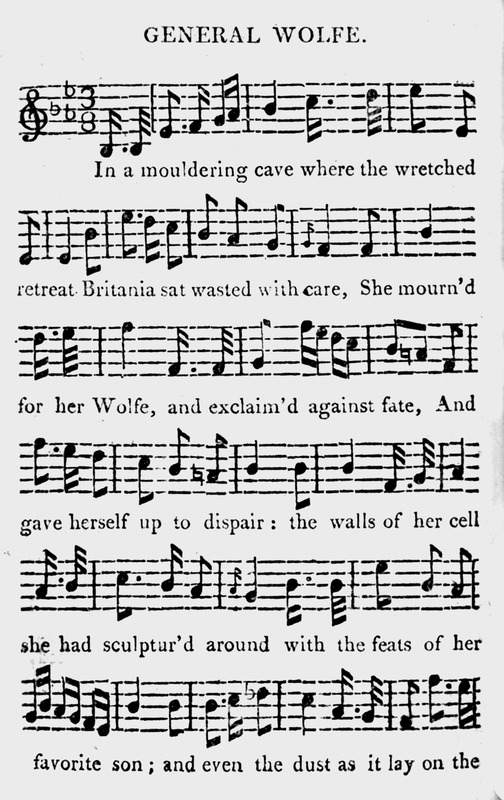
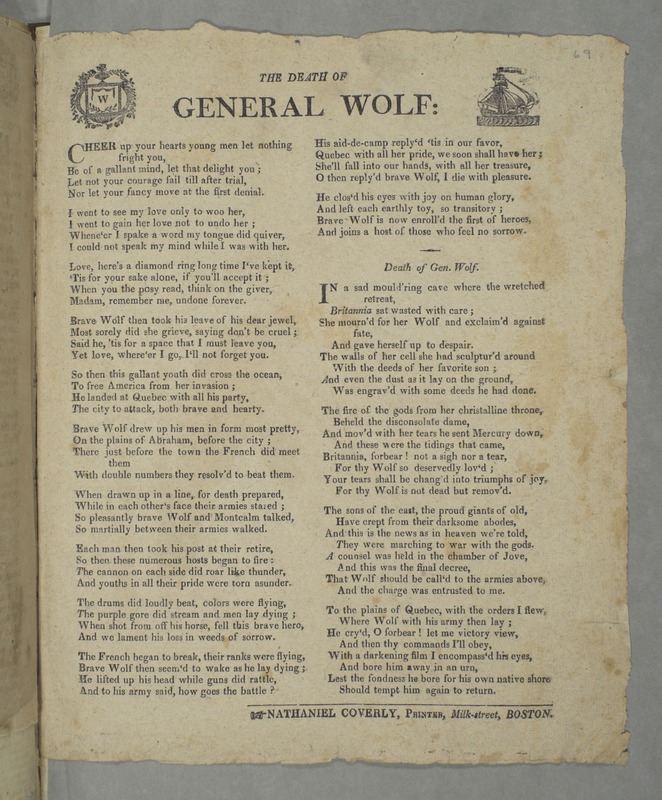
Lyrics
"Bad news is come to town, bad news is carried
Some say my love is dead, some say he's married
Bad news is come to town, I fell a-weeping
They stole my love from me while I lay sleeping"
"Love, here's a diamond ring, if you'll accept it
'Tis for your sake alone, long time I've kept it
When you this posy read think on the giver
Madam, remember me, or I'm undone for ever"
So then this gallant youth did cross the ocean
To free America from her invasion
He landed at Quebec with all his party
The city to attack, being brave and hearty
Brave Wolfe drew up his men, in a line so pretty
On the plains of Abraham before the city
A distance from the town the French did meet him
With a double number they resolved to beat him
The French drew up their men, for death prepared
In one another's face the armies stared
While Wolfe and Montcalm together walked
Between the armies they like brothers talked
Each man then took his post at their retire
So then these numerous hosts began to fire
The cannon on each side did roar like thunder
And youths in all their pride were torn asunder
The drums did loudly beat, colors were flying
The purple gore did stream, and men lay dying
When shot off from his horse fell this brave hero
And we lament his loss in weeds of sorrow
The French began to break, their ranks were flying
Wolfe seemed to revive while he lay dying
He lifted up his head while guns did rattle
And to his army said, "How goes the battle?"
His aide-de-camp replied, "'Tis in our favor
Quebec with all her pride, nothing can save her
She falls into our hands with all her treasure"
"O then," brave Wolfe replied, "I die with pleasure"
Lead Sheet
Download and print lead sheets that include lyrics, chords, and melody.

